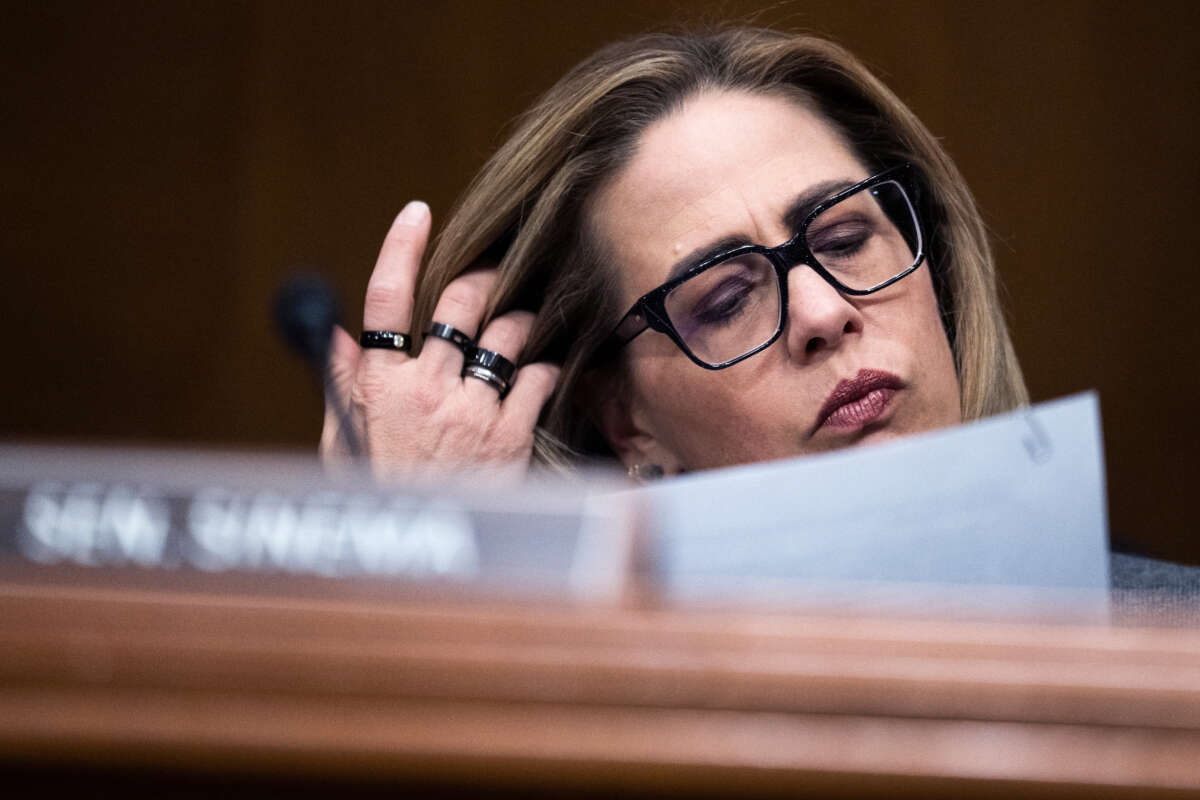As Congress has considered a wide swath of financial and tech regulations, conservative Sen. Kyrsten Sinema (I-Arizona) has been making moves to protect the cryptocurrency industry while raking in donations from crypto companies and firms backed by crypto cash, a new report by The Intercept finds.
Over the past three years, the publication found that Sinema has received more than $500,000 in campaign donations from deep-pocketed firms with a vested interest in keeping the crypto industry operational and deregulated. These donations have come from employees of crypto companies and private equity firms like Apollo Global Management and Andreessen Horowitz, which have both invested heavily in crypto funds.
The report finds that the donations began pouring in right around when Sinema was sponsoring legislation that would have regulated the industry — after which she appeared to make a heel turn on the issue.
In spring of 2021, Sinema co-founded the Financial Innovation Caucus focused on fostering financial technologies, including blockchain technology. As Congress considered its bipartisan infrastructure bill that Sinema helped negotiate, she and other caucus members proposed an amendment that would have carved out exemptions to reporting requirements for crypto but that the industry said would place supposed burdens on crypto miners; Andreessen Horowitz said the amendment would be a “stunning loss for America,” and crypto trade group Blockchain Association called it “terrible.”
Later, Sinema and other co-authors reneged and formed a compromise based in part on the industry’s concerns and came up with text that was supported by the White House and the Blockchain Association. A Sinema spokesperson said that the change was made in order to appease the White House.
As those changes were being made, Sinema received $175,000 from employees at crypto-backed firms, the report found — or about 9 percent of her fundraising that quarter. In the meantime, that year, Sinema’s partner, Lindsey Buckman, received a home equity line of credit from a blockchain-powered financial services company named Figure Technologies to finance the property where Sinema is registered to vote.
Since then, crypto markets have experienced numerous large crashes, hurting swaths of middle class people who bought into well-financed public relations campaigns. Crypto is now undergoing a huge scandal regarding fraud at major crypto company FTX, as well as multiple accusations of crypto pyramid schemes.
Sinema appeared to have continued her support of the industry. Last summer, she and Sen. Pat Toomey (R-Pennsylvania) introduced a bill that would have made small crypto purchases exempt from taxes, with support from the Blockchain Association, crypto advocacy group Coin Center, industry alliance Crypto Council for Innovation and crypto trade association Chamber of Digital Commerce. She also reintroduced the compromise legislation that never ended up in the infrastructure bill, again with the support of a wide variety of crypto trade and advocacy groups.
At the same time, in the past two years, Sinema has raised over $330,000 from crypto companies and crypto-backed firms.
This money lays the groundwork for the upcoming election in 2024, in which Sinema is expected to run as an independent. This funding will be crucial for the senator, as polls have continually found that she comes in dead last by a wide margin in a three-way race between her, Democratic challenger Rep. Ruben Gallego and a Republican candidate.
Gallego has been massively outraising her in the election so far, with the vast majority of donations coming from small donors; in the first quarter of this year, the Gallego campaign reported that it raised $3.7 million from over 65,000 individuals, versus Sinema’s 930 individuals, raising $2.1 million for the senator.
Join us in defending the truth before it’s too late
The future of independent journalism is uncertain, and the consequences of losing it are too grave to ignore. To ensure Truthout remains safe, strong, and free, we need to raise $27,000 in the next 24 hours. Every dollar raised goes directly toward the costs of producing news you can trust.
Please give what you can — because by supporting us with a tax-deductible donation, you’re not just preserving a source of news, you’re helping to safeguard what’s left of our democracy.
